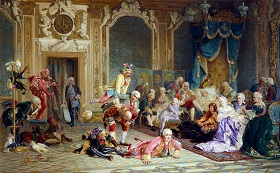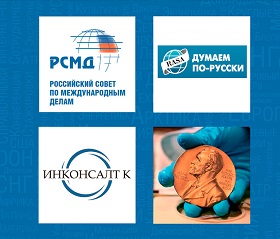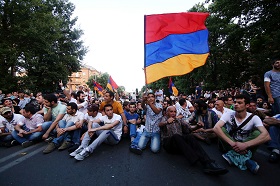After the collapse of the USSR, the West chose to pursue a “soft power” policy in the former Soviet countries by fuelling protest movements, hoping to increase its influence through democratization. Experts in “orange revolutions” linked to Western bureaucratic structures have formed a “new international” to promote democracy. Continued use of this model of working with civil society and opposition forces is fraught with political destabilization in the post-Soviet space. The concept of “soft power” that is emerging in Russia consists in forming “a thousand threads” linking Russia to the former Soviet countries through dialogue at the expert, cultural and academic levels. This may become an effective answer to the Western approach.
The “Soft Power” Trend
Intellectual vogue for political concepts sometimes leads to these concepts being treated as absolutes. And this happened in part to the concept of “soft power”. Stressing the shortcomings of Russia’s foreign policy in that department has become commonplace, especially in regard to the crisis in Ukraine.
Some of the criticisms are not without grounds. However, the Ukrainian crisis has a whole range of underlying causes that had been building up over decades, and it would be simplistic to reduce everything to the “soft power” contest between Russia and the West. “Soft power” is one component in the arsenal of a state’s foreign policy instruments whose effectiveness depends not only on the investment of resources, but also on general geopolitical trends.
The concept of “soft power” was formulated within the American foreign policy establishment in the late 1980s and bears the imprint of the geopolitical position of the United States as the world’s “sole superpower”. Obviously, in the case of Russia or China, “soft power” instruments may function very differently from the way they function in the United States.
It would be appropriate here to recall the theory of cultural hegemony propounded by Antonio Gramsci, or the more modern concept of “zones of prestige” by American sociologist Randall Collins [1]. The attraction of such zones is due in large part to the foreign policy influence of the states representing it. In other words, “soft” and “hard” powers are interconnected. At the same time, it would be simplistic to represent “soft power” as a function of just one variable, i.e., the foreign policy might of a state.
The Need to Tread Warily
The weakness of Russian “soft power” is usually mentioned in connection with the post-Soviet space. One simple recipe that has been suggested is to shift the focus in the work of national elites to civil society. However, that recommendation is too general. Besides, excessive attention to civil society and opposition forces may arouse suspicions and create tensions in Moscow’s relations with the governments of the former Soviet Union republics.
Most importantly, it would not solve the problem of the weakness of state institutions that contributes to the volatile political situation in a number of former Soviet countries. Anti-Russian sentiments often tend to mobilize opposition forces in accordance with the simple rules of the political “blame game”. Experts in “orange revolutions” seek to use opposition sentiments to further their own ends.
Can Russia afford to play the same games, turning the former Soviet countries into a battlefield? The tactic of reasonable non-interference, especially with regard to political games initiated by the local authorities, is often preferable. Thus, the media campaign for the signing of an association agreement with the European Union backed by the Viktor Yanukovych administration in Ukraine created a groundswell of support for Euro-integration. In 2013, more than 50 per cent supported it; in late 2012, the ratio between those who wanted Ukraine to join the EU and the Customs Union was 50:50 (even according to Western opinion surveys).
“Soft Power” Models
This brings us to the question of the strategic vector of Russia’s “soft power”. Several models of “soft power” policy can be identified.
The “orange revolutions” demonstrate the model of a “New International” aimed at fostering and controlling revolutionary sentiments. The American foreign policy establishment is wedded to the concept of “winning the hearts and minds” of people across the world. True, as witnessed by numerous examples (Kyrgyzstan, Ukraine), it is far more difficult to manage protest sentiments than to kindle them.
The model of “a thousand threads”, that is, strengthening mutual trust between countries through dialogue between the publics and experts, may become an alternative to “New International”. This model envisages a very different set of instruments of “soft power”, above all expert, cultural and social dialogue with the aim of implementing multilateral “people diplomacy” projects. It is important that successful projects be tied in with existing programmes of inter-state cooperation and provide the basis for new ones. This is a politically conservative policy compared with the policy of supporting the opposition. It can be almost completely depoliticized, with progress channelled into sociocultural, economic and scientific spheres.
Rossotrudnichestvo, the Gorchakov Fund, the Moscow House in Minsk and a number of other organizations are blazing trails in that direction. Their methods in the post-Soviet space differ markedly from the methods used, for example, by the National Democracy Institute (NDI) or Pact, which are aimed mainly at supporting opposition initiatives. It has to be noted that today Western “soft power” organizations no longer confine themselves to encouraging political opposition and are introducing a development agenda (nature conservation, legal consultancy, regional development, etc.). Pro-Western groups are often more effective in promoting new media in the post-Soviet space (Ukraine being an eloquent example).
A state cannot win international respect unless it explains its interests and values, and not only at diplomatic meetings, but also to a broader audience. The struggle over the interpretation of events has become part and parcel of modern international relations. A refusal to take part in international polemics may lead to isolation in the information field.
Thus, it is important to explain one’s position in various countries using the available resources. Take the contrasting example of Poland, which helps to better understand the situation in the post-Soviet space. The Polish government takes a critical stand with regard to Russia. However, the expert and academic communities present a variety of views. The civil groups and Orthodox communities in the country’s eastern regions form part of Russian culture historically. Russia cannot afford to leave them to their own devices, especially since Warsaw is actively pursuing a policy of issuing Polish identity cards, including to citizens of Russia and Belarus.
This is not to say that Russia’s foreign policy should be tailored to the eclectic doctrine of the “Russian World”, which comprises many different trends. The concept is often perceived as a threat even by some elite groups in former Soviet states. Belarus rejects this concept at the official level. Horror stories abound that concern not only the “Russian”, but also “Polish”, “Turkic” and “Chinese” worlds. Nevertheless, the influence of these cultures in certain areas is a self-evident fact, and actions to control this influence may lead to conflicts, as happened in Donbass. What is needed is clever and careful work with cultural strata in the format of inter-state cooperation. Failing that, the risk of conflicts increases dramatically.
While we should not expect too much from “soft power”, nature abhors a vacuum. New generations of politicians and public figures have not only certain convictions, but also career plans. The industry of non-governmental organizations in the West offers career prospects for young public and political activists. In other words, the “revolutionary international” is not only a way of self-expression, but also a career boost for those who take part in it.
That is why it is hard to overestimate the importance of academic and cultural exchanges, internships and support of the Russian language as the lingua franca in the post-Soviet space. The policy of tying “a thousand threads” contributes to deeper mutual understanding between countries, even though it cannot solve all the problems. A lack of deep insight into the processes in other countries and societies often leads to missed diplomatic opportunities. Consistent efforts do not guarantee quick results, which may take time and patience to materialize.
“Soft Power”: The Vertical and the Horizontal
The resource of the policy of “a thousand threads” is provided not by top-bottom vertical information influence, but by a dense network of horizontal interconnections, the emergence of numerous contact points at the expert, academic, cultural and public levels. The drivers of this process are more likely to be not opposition “rebels”, but rather “social craftsmen” capable of initiating international projects and establishing links with official bodies, resource centres and partners from other countries in the Eurasian region.
The future of Russia’s “soft power” in the post-Soviet space hinges on the ability to form a common supranational approach to the issue. The Eurasian Economic Union is a promising resource for working out common programmes and dialogue formats that may later be extended to other countries in the Eurasian region. The nucleus of the Union – Russia, Belarus and Kazakhstan – is cemented by more stable state institutions that shape common integration interests. This can be the foundation for a multilateral format of projecting “soft power” as a collective enterprise of stabilizing the post-Soviet space and promoting horizontal ties.
Establishing a trusting dialogue at the level of experts and non-governmental groups takes on added importance against the background of growing international instability, when the alternative to growing mutual understanding is growing misunderstanding. The” soft power” policy based on the “thousand threads” principle can only be effective if it is a two-way street. This would offer real hope that “soft power” in the post-Soviet space would be associated less and less with “orange revolutions”, giving way to the craft of building horizontal ties.
1. Collins, R. Civilizations as Zones of Prestige and Social Contact // Arjomand S.A., Tiryakian Е.A. (eds.) Rethinking Civilizational Analysis. Sage Publications, 2004, pp. 132–147.







